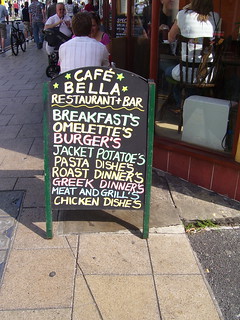Punctuation Drunk
Disclaimer: given that this blog entry is about the correct use of English there will no doubt be a large number of typos and incidences of misuse.One thing you hear a lot about these days is the so-called bastardisation of the English language. These complaints take many forms but seem to boil down to a couple of main griping areas:
- The old complaining about the way the young use language (thinly veiled youth envy)
- The British complaining about the way Americans use language (thinly veiled xenophobia).
What does this mean for the development of the language?
In the past people becoming geographically isolated from each other usually resulted in the development of dialects and eventually new languages altogether. This is of course what's responsible for the differences between American English and British English - although some of the British complainants may be dismayed to realise that the American form of certain usages, spellings and pronunciations is actually the original, the differences having arisen on this side of the Atlantic in the interim. The reverse is also true of other usages, spellings and pronunciations, so when it comes down to it who is bastardising whom? Both forms are in fact equally valid descendants of the kind of English spoken 500 years ago, a kind of English that no longer exists.
However, the digital preservation of forms of English from up to sixty or seventy years ago means that from now on these older forms of language will continue to exist and this, combined with an accelerated change, means that dialect may start to develop not just due to a lack of spatial proximity but also due to a temporal distance. Language changes and language evolves. Just because some people don't like the idea of LOL or WTF entering into common spoken usage, it doesn't mean that it's wrong any more than either one of "color" or "colour" are wrong.
Chill out.
 Misuse of apostrophes is another matter of course. An apostrophe is used to indicate missing letters due to an abbreviation or contraction of a longer word or phrase. Sometimes they fall out of use as part of normal language evolution - no-one says lunch' any more (short for luncheon) - but where apostrophes are (or aren't) used now is still important and probably always will be. Some claim to hate apostrophe pedantry as much as the apostrophe pedants hate the rogue punctuation marks themselves, but I suspect some of that is a deliberately contrary stance, perhaps adopted by former pedants who found that the obsession was beginning to take over their lives...
Misuse of apostrophes is another matter of course. An apostrophe is used to indicate missing letters due to an abbreviation or contraction of a longer word or phrase. Sometimes they fall out of use as part of normal language evolution - no-one says lunch' any more (short for luncheon) - but where apostrophes are (or aren't) used now is still important and probably always will be. Some claim to hate apostrophe pedantry as much as the apostrophe pedants hate the rogue punctuation marks themselves, but I suspect some of that is a deliberately contrary stance, perhaps adopted by former pedants who found that the obsession was beginning to take over their lives...I will now stand up and confess that I am a confirmed apostrophe pedant. Years of having to copy out Section 13 of the Modern English Usage rules book at school whenever I made a mistake saw to that. Whilst I can understand how they might fall out of use in some instances due to the evolution of language (see lunch' above), I can't fathom why people add them where they're not needed. It's as if people have heard that there are these things called apostrophes and know that they're something to do with adding the letter S on the end of words but beyond that have no clue.
According to a piece in the Guardian today, a Devon district council have had enough and decided to abandon the apostrophe altogether. Whilst this may solve half the problems - never again will people have to wonder about how a root vegetable can own money when they see a sign reading Carrot's 30p - it probably creates just as many new ones and seems to be being done out of laziness more than anything else.
The odd thing is that the rules aren't that difficult. Section 13 of Modern English Usage was relatively short, so copying it out wasn't actually that onerous a task.
So come on everyone. It's easy and would make a lot of pedants very happy.



Comments